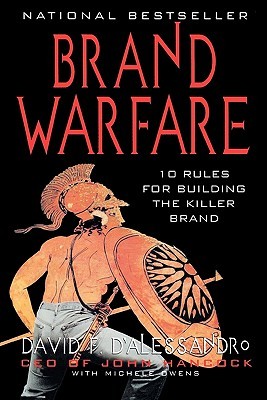 10 Rules for Building the Killer Brand
10 Rules for Building the Killer Brand
The selling power of brand images is enormous – it is so big that even something ordinary can become “special” in the eyes of customers if it belongs to a particular brand. Take Orville Redenbacher for example, when he made a name out of his popcorn and attracted customers to buy it.
Similarly, the John Hancock company turned insurance into a more attractive product for consumers.
Who Should Read “Brand Warfare”? And Why?
They mention not only successful stories, but negative examples as well. The basic principles that the authors refer to are familiar: continually working on your brand, sponsoring events, keeping up with the changing environment, etc.
However, they pack their principles in fresh and breezy writing. So, if you like reading books on branding and marketing, this may be the book for you. We recommend “Brand Warfare” to beginners who are just starting up, as well as to people who want to polish up their branding knowledge.
About David F. D’Alessandro & Michele Owens
 David F. D’Alessandro is the current CEO of John Hancock Financial Services. John Hancock is a Fortune 500 company, and under the governance of D’Alessandro, it was listed among the top 100 brands of the 20th century, according to the New York Times.
David F. D’Alessandro is the current CEO of John Hancock Financial Services. John Hancock is a Fortune 500 company, and under the governance of D’Alessandro, it was listed among the top 100 brands of the 20th century, according to the New York Times.
D’Alessandro is a frequent guest on various TV programs, like CNN News and The Today Show. He is also a keynote speaker at many events worldwide.
Michele Owens is a former speechwriter for Governor William Weld of Massachusetts.
“Brand Warfare Summary”
The strength of a brand is reflected in each enterprise’s value. Interbrand ranks the world’s most known brands each year, and according to them, more than half of the Coca-Cola Company’s value comes from its brand name.
However, branding is not connected to businesses only. Celebrities: musicians, movie stars, movie directors, writers, bloggers, think of their names as their brands.
So, what is a brand? A brand is the image and associations that pop up in your consumer’s thoughts when they encounter its name. The perceptions they get come from different places. They can come from their own customer-service experience, or they can hear about it on TV reports, or read rumors on the Internet.
Nonetheless, it does not matter where their perception comes from. What is important to you is that your brand name is connected to favorable images and thoughts. Whatever you do, have your brand in mind.
Whatever decision you make, like entering a new market, supporting a local event, or reducing your customer services expenses, do it only if you are sure that it will improve or maintain your brand image.
Another thing worth mentioning is that once you reach your desired level of brand attractiveness, you must not stop. In the previous century, if you succeeded in building a strong brand, it stayed high on the popularity scale for a long time.
However, many brands got destroyed because they were not flexible enough to meet changing market requirements. In the present day, consumers are more knowledgeable than ever.
The environment is exceptionally consumer-centered, and the new technologies pose lower market-entry barriers, so more new brands enter the market. Living in a world full of choices, it is quite easy to slip up and lose customers.
To stay competitive, you need to improve your brand and the customer experience you offer regularly. Price is no longer the dominant player in gaining and keeping customers.
If your firm comes across a problem, be sure to react quickly. First, do all you can you to protect your brand from a scandal. If false news or accusations hit you, try to resolve them before rumors spread.
If, on the other hand, you make a mistake, then don’t try to cover up information. Instead, admit it, apologize, and make up for it. Remember, the most important thing is that you are fair to your customers.
Key Lessons from “Brand Warfare”
1. Why Consumers Need Brands
2. Make Your Advertising Distinctive
3. Inspire and Motivate People
2. Make Your Advertising Distinctive
3. Inspire and Motivate People
Why Consumers Need Brands
If you believe that people do not look out for brands, think again. People pay attention – to your brand or the opposition.
The reason is apparent: branding simplifies life by organizing experiences. Brands are a sort of archetypes that help people understand what they can expect without putting too much thought into it.
Buyers face too many choices, and branding helps them by:
- Saving time by creating a feeling of comfort
- Delivering an identity and a sense of belonging to a particular group of people that also buys that brand,
Make Your Advertising Distinctive
Be careful when it comes to advertising. Don’t fall into clichés, and “proven.” techniques. Instead, try to stand out from the crowd. Support the people that are in charge of writing and designing your ads.
Do not limit their vision. Moreover, most importantly, do not be afraid to experiment with new angles and perspectives. Furthermore, when you select sponsorships, be cautious about your associates and the kind of events you sponsor.
Most of the time sponsoring events is more cost-efficient than purchasing advertising space or time.
When you are a sponsor, you get involved in a riskier contract. To be more precise, some person connected to your brand may get into some inconvenient or troublesome situation.
So, be careful whom you choose to work with, and if you manage your sponsorship correctly, it will surely bring positive results.
Inspire and Motivate People
Your brand does not influence just your customers; it affects your employees, distributors, and vendors as well. It will not only make the customers want to buy your product but will also make people want to be a part of your enterprise.
When you establish a good brand – everyone will wish to get connected to your name. Take advantage of it, and continue motivating both your internal and external audiences.
“Brand Warfare” Quotes
There's a tremendous arrogance that comes from having a big brand, and that arrogance makes it easy to forget that even the biggest brand only stays big at the pleasure of the consumer.Want to make memorable advertising? Protect the creatives, and you'll soon have the best copywriters and art directors in the world clamoring to work for you, and great work will follow of its own accord.Since everything a corporation does reflects on the brand, for better or worse, every decision a corporation makes ought to be filtered through the prism of the brand.Brand messages are not infinitely elastic. If you try to stretch them too far, they tend to unravel.It is a small step in this world from rich corporation to villain, and any big brand that doesn't keep that constantly in mind is foolish.Our Critical Review
This book is a simple guide to protecting your brand image. Authors D’Alessandro and Owens present the principles of brand-building and protection and illustrate the process by mentioning real case scenarios.

0 comments:
Post a Comment
Note: only a member of this blog may post a comment.